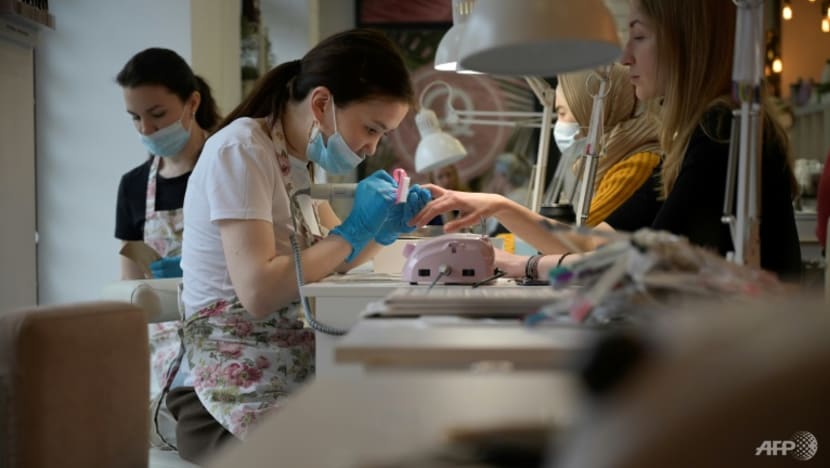Commentary: Dreading pushy sales staff at beauty salons? Here’s how you can fight back
Rather than sit through aggressive up-selling or worse, give in and sign up for packages worth hundreds, we should be brave and ask them to back off, says Tracy Lee.

Manicures at a nail bar. (Photo: AFP/Natalia KOLESNIKOVA)
SINGAPORE: I almost fell off my chair when I read about a man whose 67-year-old mum had racked up S$80,000 in credit card bills at a nail salon in two years – including an S$11,000 charge for a single visit.
According to the report, the salon staff would repeatedly call his mother and harass her to return to the store and prevent her from leaving if she did not purchase more services and packages. Considering how an average manicure and pedicure costs about S$70, spending S$80,000 is staggering.
Even if you led a life of extreme leisure and were hyper-conscientious about personal grooming, opting for weekly sessions, your salon bill would come up to about S$3,640 a year. Maybe double that if you’re into fancy, complicated nail art.
It is clear the woman was trapped in a “hard-sell” hell that many of us who frequent beauty salons are familiar with.
The techniques, as listed on the financial website Investopedia, are designed “to flatter them, play on their fear of missing out and attempt to convince them that buying a product will be a smart decision that will improve their lives”.
These practices exist because they can lead to increased sales. The salesperson basically utilises the time accorded to them when the customer is there for the fixed time and has no time or means to compare other deals. Quite often, the sales commissions tagged to these deals are also sizeable, says Investopedia.
Not surprisingly, this approach can be counterproductive. It can alienate, annoy or scare off potential buyers, make repeat buys less likely or provoke an aggressive response from customers, reducing overall sales and negatively affecting the reputation of the salesperson and company.
Related:
THE ONSLAUGHT OF HARD-SELLING AT SALONS
The beauty industry consistently ranks among the top three industries in terms of the number of complaints received by the Consumers Association of Singapore (CASE), mainly for pressure sales tactics.
In Singapore, the standard modus operandi goes something like this: The customer is first enticed with a free or low-priced session.
Before the treatment, the customer is ushered into a small consultation cabin, where a consultant suggests an add-on, upgrade or purchase of a multi-session package (the ubiquitous calculator often makes an appearance at this point).
Let’s assume the customer says no, she still has to go through the service she arrived for in the first place and this is where part two of the onslaught begins. Blinded by a mud mask, immobilised in cling wrap or literally freezing one’s butt off, the hard-sell continues unabated.
Finance manager Felicia, who had purchased a 10-session Brazilian IPL (intense pulsed light) hair removal package at a promotional price, recalls: “Each time I turned up, the salon consultant would try and persuade me to upgrade to a more expensive treatment.”
“After the tenth and final session when I turned her down yet again, she practically shrieked: ‘But your condition is very, very serious! How can you bear to live with it?’
“She made me feel as if I had a terminal illness. I was humiliated and of course, never went back to that salon again.” While Felicia hadn’t taken the bait, many people do, for various reasons.
WHY WE SUCCUMB
Notice how salon consultants are usually slim, attractive and well-groomed? They’re very likely to claim the reason they look the way they do, is because they’ve undergone the exact treatment they’re recommending you.
But look at any recruitment ad for a beauty or wellness salon, and you’ll notice “well-groomed” and “presentable-looking” are pre-requisites for hiring said consultants.
These consultants make you fill in forms to list down issues you’re unhappy with wrinkles, extra flab, lacklustre hair, that ache-y tech neck – which are then used as ammunition against you. They now know exactly which of your insecurities to prey on.
Some show “before” and “after” pictures of other customers to “prove” the efficacy of the treatments, and if you’re still not convinced, there’s always a high-powered diagnostic scope they can use to zoom in and magnify your problem areas (say dandruff or crows’ feet) by 100 times.
We also respond to flattery, so staff members would say things like, “Actually, you look amazing for your age. You just need to lose that forehead furrow to look 10 years younger.”
Being human, we don’t want to miss out on a bargain as well. Have you noticed how the starting price punched into the calculator can run to several thousand, but within minutes, slide down to a couple of hundred dollars?
So, when the salesperson points out how much we’re saving thanks to the hefty discount on offer for a limited time only, and with free gifts or extra services thrown in, FOMO sets in.

We succumb, whether we actually think we’re getting a bargain or if only to put a stop to their incessant sales pitch. Perhaps there are also some who do find it comforting to see their beauticians often because they enjoy the pampering and the social connection. And when there’s a relationship, it can be hard to say no when your favourite nail technician upsells.
START BY SAYING NO
Whatever it is, it helps to arm yourself with a few assertively-worded phrases, so you don’t ever get coerced into paying for an overpriced beauty service you don’t want or need.
Spread the word to your friends and family, especially older women in your circle.
My mum once almost bought a S$250 hand cream because the salesperson offered her a free tub of sea salt scrub, until I pointed out that drugstore-brand hand cream costs less than S$10. She even could make her own scrub in minutes for free, using sea salt and olive oil from her kitchen.
It could be as easy as saying “I’m pretty broke right now, I can’t afford it”. Or, say you’ve got an existing treatment package at another salon that you’ve yet to finish.
If they still don’t back off, you may have to get slightly more belligerent: “I’ve already said no, so if you keep harassing me, I will report you to CASE or leave a review about what happened online.”
And, if you don’t want to make things ugly, just lie and say “I am moving or migrating”. Of course, this means you can’t go back there in the near future, no matter how good the nail technician was.
Tracy Lee is a freelance writer based in Singapore who writes about food, travel, fashion and beauty.
















